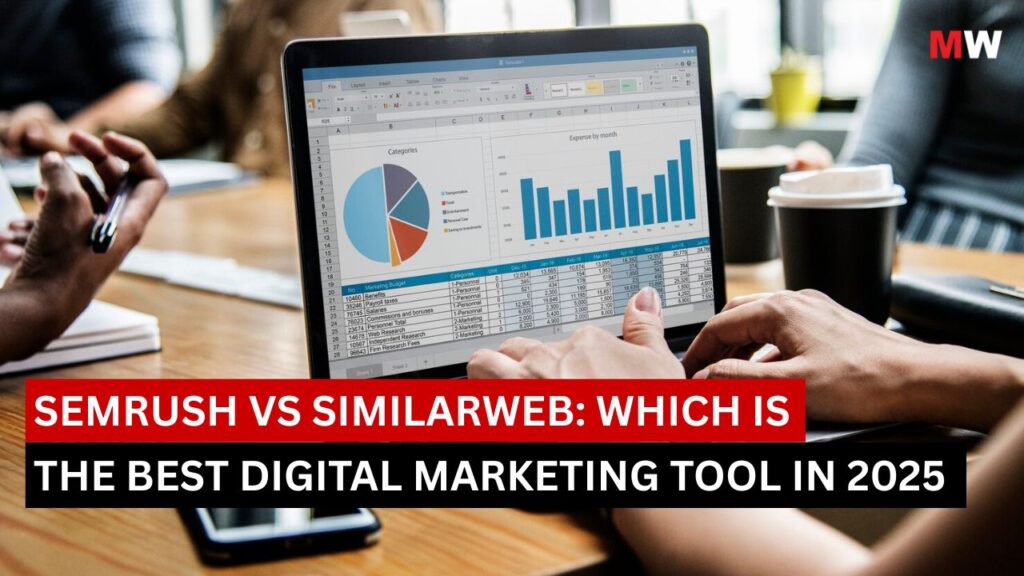Compare Similarweb vs SEMrush in 2025 to choose the best platform for traffic analysis, SEO, and PPC. Discover Similarweb’s edge in market insights to boost ROI.

In the fast-evolving landscape of digital marketing in 2025, selecting the right platform can significantly impact your strategy’s effectiveness. SEMrush and Similarweb stand out as powerful platforms, each bringing unique strengths. SEMrush is renowned for its all-in-one suite covering SEO, PPC, and content optimization, while Similarweb excels in providing in-depth traffic analytics and market intelligence as an all-in-one solution. Similarweb, with 3.8 million monthly visits and coverage of 100+ million websites, leads in AI-powered traffic analytics and market intelligence, empowering businesses in New York, Dubai, or Sydney. SEMrush, serving 1.17 million active users, offers 55+ tools for SEO and PPC.
Similarweb: Unmatched traffic analytics, audience profiling, and app insights. It provides deep insights into competitor strategies and market trends.
- SEMrush: Robust tools for keyword research and geo-targeted PPC. It excels in identifying high-value keywords and optimizing ad campaigns for specific regions.
- Why It Matters: 75% of marketers prioritize data-driven tools for ROI.
Ready to elevate your marketing? Discover why Similarweb shines in 2025.
Overview of SEMrush and Similarweb in 2025

Similarweb: The Market Intelligence Leader
Established in 2007, Similarweb has become the go-to platform for digital research, helping businesses in over 190 countries analyze how their digital markets perform. With coverage of 100+ million websites, 4M+ mobile apps across 58 countries, and over 3.8 million monthly visits, it provides unmatched reach and data precision.
In 2025, Similarweb introduced expanded AI Intelligence features. These use generative AI to interpret market and conversational trends—telling marketers how their category is being discussed across channels and emerging AI models. While it doesn’t offer demographic-level audience insights, it enables powerful strategic decision-making for brands making it all in one solution and hence the market leader..
The platform’s reach is not limited to major enterprise companies—mid-sized businesses and high-growth startups increasingly adopt Similarweb due to its monthly pricing options and flexibility.
SEMrush: The SEO and PPC Powerhouse
Since 2008, SEMrush has served 1.17 million users with 55+ tools, including 26.5 billion keywords and 43 trillion backlinks. Its Keyword Strategy Builder supports local SEO in Sydney but lags in traffic analytics compared to Similarweb.
Why Compare in 2025?
With global digital ad spend exceeding $900 billion, platforms like these are vital. While SEMrush excels in execution, SimilarWeb’s broad coverage and accuracy make it indispensable for strategic planning. Both offer trials: 14 days for SEMrush and 7 days for SimilarWeb.
Pro Tip: Try Similarweb’s 7-day free trial for traffic insights or SEMrush’s 14-day trial for SEO.
Why Similarweb Excels in Market Intelligence
Similarweb leads in 2025 with AI-powered traffic analytics, offering unmatched insights for strategic planning. Its key strengths include:

- Traffic Accuracy: 30% more accurate for large sites, providing detailed source breakdowns. SEMrush’s traffic tools are less comprehensive.
- Audience Insights: AI-driven profiling across 190 countries, e.g., a Chicago brand targeting millennials. SEMrush offers basic demographics.
- App Analytics: It covers 4M+ apps in 58 countries with 2.8K+ SDKs across 32 categories and 4B ratings/reviews. SEMrush lacks app tools.
- Benchmarking: Compares against 100+ million sites for market positioning. SEMrush’s trends require a $200/month add-on.
SEMrush shines in SEO but falls short in traffic depth.
Pro Tip: Choose Similarweb’s Digital Intelligence Suite over SEMrush’s trend for competitor analysis.
Feature-by-Feature Comparison: SEMrush vs Similarweb

Traffic Analysis
- Similarweb: Tracks 100+ million websites with AI-driven market insights.
- SEMrush: Provides source breakdowns, less detailed.
- Winner: Similarweb, for superior traffic analytics.
SEO Tools
- Similarweb: Basic keyword research (5B keywords), limited SERP analysis, and a basic site audit. Strong in trending keywords and combined organic-paid SERP tracking.
- SEMrush: Keyword Strategy Builder, comprehensive site audit (130+ issues), 43 trillion backlinks.
- Winner: Tie SEMrush leads in SEO depth, Similarweb excels in keyword intelligence and SERP insights.
PPC Tools
- Similarweb: Competitor PPC insights, ad messaging, spend, and landing page analysis.
- SEMrush: AI bid optimization for geo-targeted campaigns.
- Winner: Similarweb, for competitive PPC intelligence; SEMrush excels in campaign execution.
Content Marketing
- Similarweb: Focus on traffic analytics, no content tools.
- SEMrush: ContentShake AI for blog optimization.
- Winner: SEMrush, for content solutions.
Social Media
- Similarweb: Basic social traffic data.
- SEMrush: Tracks X, Instagram, LinkedIn with ad insights.
- Winner: SEMrush, for social analytics.
Data Accuracy
- Similarweb: 30% more accurate for large sites.
- SEMrush: 95% SEO/PPC accuracy.
- Winner: Similarweb for traffic; SEMrush for SEO/PPC.
- Pro Tip: Pair Similarweb’s traffic analytics with SEMrush’s SEO tools for a strong, balanced marketing strategy.
Pricing Breakdown for 2025
Similarweb Pricing
Similarweb’s 2025 plans focus on traffic analytics:
Plan Comparison: Starter vs. Professional
| Feature | Starter Plan | Professional Plan |
| Price | $125/month if billed annually ($1,500/year)
or $199/month |
$333/month if billed annually ($4,000/year) or $399/month |
| Users | 1 | 1 |
| Historical Data | 3 months | 6 months |
| Keywords per Table | 1,000 | 5,000 |
| Geographic Filtering | Worldwide only (no country filter) | Worldwide only (no country filter) |
| Tools Included | Rank Tracker, Backlinks, Site Audit | Rank Tracker, Backlinks, Site Audit |
| Free Trial | Yes | Yes |
SEMrush Pricing
SEMrush emphasizes SEO value:
| Plan | Best For | Monthly Price (Annual Billing) | Regular Monthly Price | Projects | Key Features |
| Pro | Beginners & Individual Projects | $117.33/mo | $139/mo | Up to 5 | Keyword research, Competitor analysis, Position tracking, Backlink analysis, Site audit |
| Guru | Small Businesses | $208.33/mo | $249/mo | Up to 15 | All Pro features + Historical data, Multi-location/device data, ChatGPT search tracking, Content marketing tools |
| Business | Agencies & Mid-Market Companies | $416.66/mo | $499/mo | Up to 40 | All Guru features + Share of Voice, Extended limits, API access, Migration support |
Similarweb’s wins in traffic and accuracy underscore its market intelligence leadership, with its all-in-one design ensuring SEO and other tools are readily available, even if SEMrush leads in specialized depth.

Value Analysis
SEMrush starts lower and packs more features into entry-level plans, making it cost-effective for SEO-focused users.
Similarweb’s higher entry point suits mid- to enterprise-level companies needing extensive traffic data, but with monthly subscriptions available, it’s accessible beyond just large organizations. For budget-conscious teams, SEMrush offers better scalability, mid-sized and enterprise users may prefer Similarweb’s bespoke options.
Pro Tip: Select Similarweb’s Business plan for comprehensive analytics or SEMrush’s Pro for tight budgets.
Ideal Use Cases for Each Tool

When to Choose Similarweb
- Market Research: Gain a high-level view of industry trends and competitor traffic. For example, The Hershey Company used Similarweb to win market share for its retail partners.
- App Analytics: Track app rankings for tech startups. Monitor user engagement and download trends.
- Audience Profiling: Understand user behavior and interests to inform campaign targeting. For instance, a Toronto-based fashion brand can analyze audience interests to refine ad messaging and placements.
PPC Features
- Reveal competitors’ PPC ad messaging, targeted keywords, and estimated ad spend.
- Analyze paid landing pages to identify high-performing design and content strategies.
- Track seasonal PPC performance trends to optimize budget allocation.
- Access competitor SEM performance data to refine your paid search strategy.
Keyword Features
- Discover fresh, traffic-driving keywords with accurate monthly search volume and trending data.
- Monitor ranking performance across full SERP (organic + paid) for targeted keywords.
- Analyze keyword demand trends and competitor keyword strategies for better targeting.
- Filter for “Last 28 Days” or trending keywords to capture early ranking opportunities.
When to Choose SEMrush
- SEO Campaigns: Agencies handling client sites benefit from site audits and keyword tools, e.g., boosting rankings for “New York real estate” queries.
- PPC Ads: Marketers running geo-targeted ads, like “Sydney fitness classes,” use its tools for setup and refinement.
- Local SEO: Tools for directory management enhance visibility in map packs.
Combined Approach
This combined approach will provide a holistic view of the competitive landscape, enabling the startup to identify high-potential keywords, analyze competitor strategies, and optimize its own digital marketing efforts for maximum impact and sustained growth in the Singapore market.
Pro Tip: Check Mavenwit’s Digital Marketing Guide for SEMrush tutorials.
Best Practices to Maximize Tool Performance

Similarweb Best Practices
- Traffic Monitoring: Track competitors monthly to understand their performance.
- Audience Analysis: Use AI-driven Insights for campaigns to tailor your marketing efforts.
- Benchmarking: Compare against 100+ million sites for KPIs to gauge your position in the market.
SEMrush Best Practices
- Site Audits: Run biweekly to fix issues. Focus on critical technical SEO aspects.
- Keyword Tracking: Monitor local rankings like “Dubai yoga studios.” Analyze SERP features for better visibility.
- Content Optimization: Use ContentShake AI for blogs. Ensure content aligns with search intent and user engagement.
General Tips
- Integrate Tools: Sync Similarweb with CRM or SEMrush with Google Analytics for a more holistic view of your data.
- Stay Updated: Follow @Similarweb2025 on X for trends to keep your strategy fresh and relevant.
- Test Trials: Evaluate tools with free trials to ensure they meet your specific needs before committing.
FAQs
Which Tool Leads in Traffic Analysis for 2025?
Similarweb excels with 30% higher accuracy for large sites, covering 100+ million websites.
Can Similarweb Handle SEO Needs?
Similarweb offers basic keyword research, but SEMrush’s 26.5 billion keywords lead in SEO.
Is Similarweb Effective for PPC?
Similarweb provides global PPC insights; SEMrush excels in geo-targeted ads.
Which Tool Offers Better Value?
Similarweb’s Professional plan ($399/month) is ideal for traffic insights; SEMrush’s Pro ($139.95/month) suits SEO budgets.
Can Both Tools Be Combined?
Yes, use Similarweb for traffic and SEMrush for SEO/PPC.
Conclusion
In 2025, SEMrush and Similarweb serve complementary roles in digital marketing. SEMrush shines for hands-on optimization across SEO, PPC, and content, making it versatile for daily operations. Similarweb dominates in traffic and market analysis as an all-in-one platform, perfect for strategic planning in mid- to enterprise-level companies. Neither is universally “best” ; it hinges on your priorities. Test both trials to see what drives your success, and consider integration for maximum impact. For tailored advice, reach out to their support teams.

Consider your specific needs and budget, and leverage the available free trials to make an informed decision for your digital marketing success. Start with Similarweb’s 7-day free trial or SEMrush’s 14-day trial. Visit Mavenwit’s Digital Marketing Guide or contact Similarweb Support for tailored strategies.








